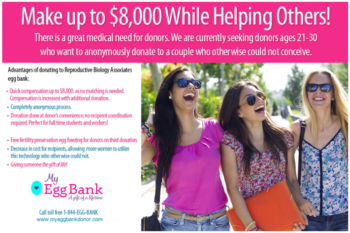By Kallie Fell —

The infertility industry in the United States has grown to a multi-billion-dollar business. What is its main commodity? Human eggs. Young women all over the world are solicited by ads—via college campus bulletin boards, social media, online classifieds—offering up to $100,000 for their “donated” eggs, to “help make someone’s dream come true.” But who is this egg donor? Is she treated justly? What are the short- and long-term risks to her health? The answers to these questions will disturb you.
Misleading advertisements in online classifieds, social media, and college newspapers offer money for school, spring break, or other college expenses. A quick Google search will show you that these ads are markedly coercive and manipulative of young, college-aged women as they directly appeal to their financial need without any mention of the potential health risks involved— essential information to enable informed decision-making and consent.
Once selected, the medical process required for egg retrieval is lengthy and there are medical risks associated with each step. Risks include, but are not limited to:
Ovarian Hyper Stimulation Syndrome (OHSS)
Loss of fertility
Ovarian torsion (requiring surgery)
Stroke
Kidney Disease
Premature menopause
Ovarian cysts
Cancer
Although sufficient data exist on procedure-associated short-term risks for oocyte donors, such as ovarian hyperstimulation syndrome, long-term follow-up studies of egg donors are lacking and their health risks are unknown. Possible long-term risks could include breast cancer; egg donor registries are desperately needed to facilitate long-term studies on egg donors!
Lupron®, the drug commonly used in the first step of the egg donation process to stop ovarian function and thus medically induce menopause before hyperstimulation of the ovaries, is a synthetic hormone that is not approved by the FDA for use in fertility treatment. It has a Category X rating, which means if a woman gets pregnant while taking the drug there will be harm to the developing fetus. This is extremely concerning with respect to egg donors who are very fertile and may not be compliant with instructions not to be sexually active during ovarian stimulation.
Lupron® is a synthetic hormone and an “antineoplastic agent”, meaning that it is a cancer chemotherapy drug and, as such, has many risks and side-effects:
Hot flashes
Tachychardia (elevated heart rate)
Hypotension (low blood pressure)
Insomnia
Depression
Constant gnawing bone/joint pain
Osteopenia
Fibromyalgia
Autoimmune Diseases
Cancer
Hematuria (blood in urine)
Dizziness
Anxiety
Vitamin D deficiency
Osteoarthritis
Osteoporosis
Degenerative disc disease
Blood disorders
Death
A few studies have come out touting the successes of egg donation. But when you get past the headlines, what you find is that these successes refer to pregnancy outcomes, not to the health of the woman who “donates” her eggs. Unfortunately, to date there has been no major peer-reviewed medical research on the long-term effects of egg harvesting on the health of the young women who provide their eggs. This makes it impossible for women to give true meaningful informed consent relative to the health and psychological risks involved with egg “donation.”
Let the words of these egg “donors” echo in your mind:
Even though I suffered immediate life-threatening complications from the process [egg donation and retrieval], it wasn’t until many more years of medical training that I was able to understand the full scope of how I had been taken advantage of, mislead, and abandoned by the egg harvesting industry. – Sindy, M.D., Ph.D
As a result of selling my eggs, I survived a torsioned ovary, intestinal failure, and a body cavity infection. I have also survived breast cancer, including having both of my breasts cut off, and eighteen months of harrowing chemotherapy and radiation treatments. I am grateful to be alive, but I believe that all of this could have been avoided if I had not sold my eggs – a procedure that I thought was safe. – Alexandra, Ph.D.
So at some point while I was in the hospital, and they’ve never been really able to pinpoint when this happened, I had a fairly major stroke, and was paralyzed on my left side for about four and a half weeks. They went in and did an emergency surgery. And I’m talking to the woman who set up the whole egg- brokerage deal, and she said, “It sounds like we have to send you a ‘drop cycle check’”—which means you didn’t quite manage to produce what you were asked to produce. So we’re just going to send you $750 and we’re just going to call it good. – Calla, suffered a stroke after taking Lupron® and lost her ability to ever have children of her own.
Egg donation is NOT harmless like I was led to believe. It has seriously affected every part of my life. I often cry about the loss of my friends, my family, the little person with half my DNA and my ability to have my own genetic children someday. If you’re thinking about donating your eggs for ANY reason–DON’T. It’s not worth it. – Cathy
You can learn more about these women and their stories by watching our documentary Eggsploitation on Amazon.
You can also watch a shorter documentary, Maggie’s Story , to learn about one woman’s journey of “helping” others have a child they desperately wanted. Maggie was told how special she was, but she was never informed of the risks egg donation posed to her own health and well-being. She was used repeatedly for others’ gain, but when things turned bad, she was left on her own to navigate tests, treatments, surgeries, and an unknown prognosis.
Kallie Fell is executive director of the Center for Bioethics and Culture
Learn more about egg donation here.
Join the movement to #StopSurrogacyNow.



